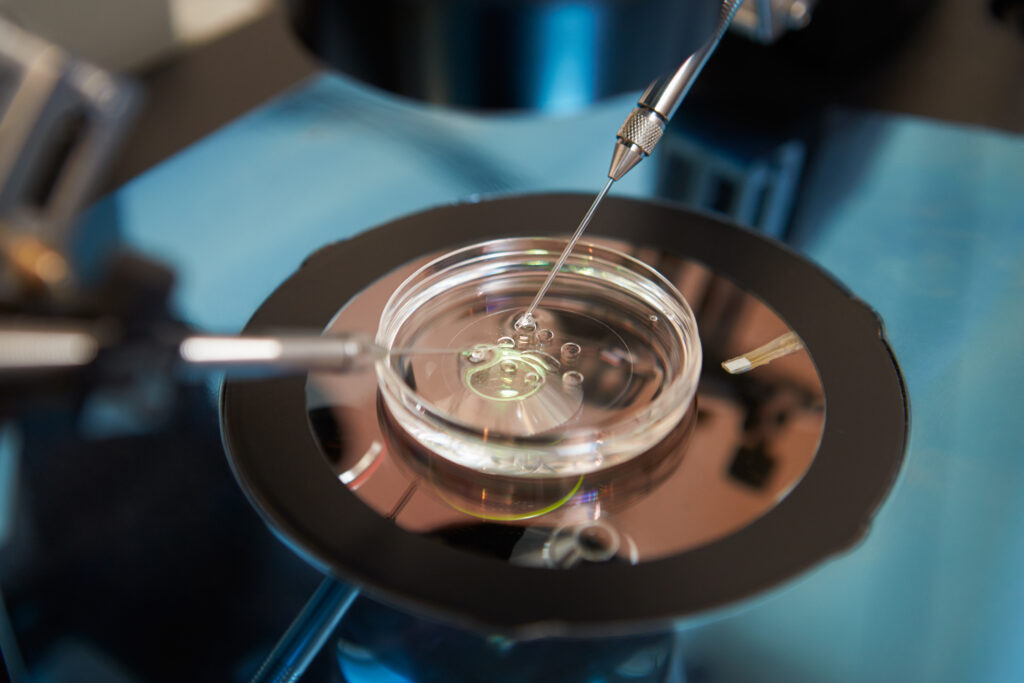


Enhancing IVF Success and Family Health
Pre-implantation Genetic Testing (PGT) is a revolutionary technology used in conjunction with In Vitro Fertilization (IVF) to analyze the genetic makeup of embryos before they are transferred to the uterus. At Dr. Diana Chavkin’s fertility practice in Beverly Hills, we offer PGT to help improve IVF success rates and reduce the risk of transmitting genetic disorders to your offspring. PGT involves biopsying a few cells from an embryo created during IVF and analyzing their DNA for chromosomal and specific genetic abnormalities. This allows us to identify chromosomally normal embryos or embryos that are not affected by specific inherited genetic conditions, increasing the likelihood of a healthy pregnancy.
Types of Pre-implantation Genetic Testing (PGT)
- PGT-A (Pre-implantation Genetic Testing for Aneuploidy): Screens embryos for an abnormal number of chromosomes (aneuploidy), which is a leading cause of IVF failure and miscarriage. PGT-A can improve implantation rates and reduce the risk of chromosomal disorders like Down syndrome by identifying such embryos before they are placed back into a woman’s uterus.
- PGT-M (Pre-implantation Genetic Testing for Monogenic/Single-Gene Disorders): Allows us to screen embryos for a specific inherited genetic disorder that is either autosomal recessive or dominant. Examples of disorders that are sometimes screened for include: cystic fibrosis, Tay-Sach’s, and Huntington’s disease. PGT-M can identify embryos that are not affected by the specific gene mutation.
- PGT-SR (Pre-implantation Genetic Testing for Structural Rearrangements): Used for individuals with known chromosomal structural rearrangements (e.g., translocations, inversions) to identify embryos with a normal or balanced chromosomal makeup.
The PGT Process involves IVF:
- IVF Cycle: Eggs are retrieved and fertilized in our laboratory.
- Embryo Biopsy: Once the embryos have developed to the blastocyst stage (typically day 5-6), a few cells are carefully biopsied from the trophectoderm (the outer layer of cells that will form the placenta). This procedure is performed by highly skilled embryologists with special microscopes.
- Genetic Analysis: The biopsied cells are then sent to a specialized genetic testing laboratory to look for either chromosomal abnormalities, a specific genetic mutation or both.
- Embryo Freezing: The biopsied embryos are cryopreserved while the genetic testing results are pending.
- Embryo Selection and Transfer: Once the results are received, Dr. Chavkin will discuss them with you and select the chromosomally normal or unaffected embryo for transfer into the uterus in a subsequent frozen embryo transfer cycle.


Who Can Benefit from PGT?
PGT may be recommended for individuals or couples who:
- Anyone who wants to increase the chance that a given embryo transfer will be successful
- Have a history of recurrent miscarriages.
- Have experienced previous failed IVF cycles.
- Are of advanced maternal age.
- Have a known chromosomal abnormality.
- Are carriers of a specific single-gene disorder.
- Have a family history of genetic conditions.

Why Choose Dr. Diana Chavkin for PGT in Beverly Hills?
- Expertise in Advanced Reproductive Technologies: Dr. Diana Chavkin is committed to offering the latest advancements in fertility treatment, including PGT-A/M.
- Comprehensive Genetic Counseling: We provide thorough genetic counseling to help you understand the benefits and limitations of PGT and make informed decisions.
- Highly Skilled Embryology Team: Our experienced embryologists perform embryo biopsies with the utmost care and precision.
- Collaboration with Leading Genetic Laboratories: We partner with the most reputable genetic testing laboratories to ensure the most reliable results possible.
- Personalized Approach: Dr. Chavkin will discuss whether PGT-A/M is appropriate for your specific situation and integrate it seamlessly into your IVF treatment plan.
Frequently asked questions (faqs)
Does PGT guarantee a healthy baby?
PGT significantly increases the chances of transferring a healthy embryo, but it cannot guarantee a healthy baby. There is still a small risk of other genetic or developmental issues.
Is embryo biopsy harmful to the embryo?
Embryo biopsy is performed by highly skilled embryologists using precise techniques to minimize any potential harm to the embryo. There is little to no risk of harm to a good quality embryo in experienced hands.
How long does it take to get PGT results?
PGT results typically take 2-3 weeks to come back. During this time, the biopsied embryos are cryopreserved.
Does insurance cover PGT?
PGT coverage varies by insurance plan. Many plans do not cover PGT, so it is important to check with your insurance provider. Our office is happy to help guide you.
What are the ethical considerations of PGT?
PGT raises ethical considerations, such as embryo selection and disposal. Dr. Chavkin and her team are committed to providing ethical and responsible care and will discuss these issues with you.
What is the difference between PGT-A, PGT-M, and PGT-SR?
PGT-A screens for chromosomal abnormalities, PGT-M tests for specific single-gene mutations, and PGT-SR is used for embryos from parents with structural chromosome rearrangements.
